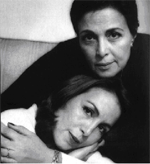 Malika and her mother
Malika and her mother
Onmy first visit to Morocco in the early 1960s I had to stop my car at the approaches to Marrakesh for a crowd of wild, romantic cavalry, turbaned figures in white on superb Barbary horses, accoutred with scimitars, silver daggers and ornate muskets. They were streaming away from an assembly with the King, Hassan II, who was on a progress, dispensing justice from the stirrup. Hassan was a shariff, descended from the Prophet, hedged about not only with military but with spiritual authority.
What that royal justice might be I did not know then. Now that I have read Malika Oufkir's story I have a clear view of it. It confirms Lord Acton's famous maxim, 'All power tends to corrupt; absolute power corrupts absolutely.' Acton, a Catholic intellectual, was thinking of the Pope and his claim to be infallible. But it applies just as aptly to any absolute monarch. A wise and just king is a figure of myth.
Oufkir's father, a Berber aristocrat from the South, a general and the most powerful figure in the kingdom of his day, attempted a coup d'etat to depose Hassan in 1972, using the air force. The attempt failed. Almost immediately and without a trial, the general was shot. According to the best authority on coups d'Ttats (Colonel Don Goodspeed, who happens to be a Canadian historian), this was probably the correct way to neutralize the rebel. What was not correct by any standard, including that of Islam, was to punish the rebel's wife and children. The outraged king had the beautiful Fatima Oufkir and her two sons and three daughters carried into the desert and imprisoned in a filthy dungeon. Two loyal women chose to share their sufferings. And in such holds and kasbahs they languished for 20 years, with inadequate food, cruel jailers, rats, scorpions and fleas.
In the atmosphere of fear, the climate of such regimes, no one spoke out against this cruelty and injustice. The family had been made to disappear like so many of their countrymen. General Oufkir had been a sinister figure himself, convicted in absentia by a French court for the murder of Ben Barca and sentenced to life-imprisonment. Granted, there may have been reason to guard against subversion being drummed up around the family, but there was no excuse for the vindictive way they were treated. In despair, four of the young people tunneled their way out of a closely guarded prison at Bir-Jdid.
 Theirs has to be one of the most amazing adventures in the calendar of Great Escapes. Weakened as they were by sickness, isolation and undernourishment, the young people got as far as Tangier before being recaptured, and, despite being turned away by friends and embassies, they managed to contact the French media. Once their story became public knowledge, they were more or less safe. Now, there was international pressure on the king; he had been exposed as a cruel tyrant. For four more years of broken promises the family was subjected to house arrest. At last they were given their passports and, with their health ruined, set free.
Theirs has to be one of the most amazing adventures in the calendar of Great Escapes. Weakened as they were by sickness, isolation and undernourishment, the young people got as far as Tangier before being recaptured, and, despite being turned away by friends and embassies, they managed to contact the French media. Once their story became public knowledge, they were more or less safe. Now, there was international pressure on the king; he had been exposed as a cruel tyrant. For four more years of broken promises the family was subjected to house arrest. At last they were given their passports and, with their health ruined, set free.
What makes the story even more poignant is that the narrator, the strikingly beautiful Malika, had been adopted by the king as a companion for his daughter Princess Lalla Mina. This meant that the girl's father had been killed by her step-father, to whom she also owed her miserable captivity.
The story is shocking. I don't know which is more dismaying, the account of palace life in the harem or the cruelties visited by the tyrant on innocent children.
One reads about a household in which the Master is followed around by his concubines and attended by crowds of slaves. There are paradoxes here in plenty. The harem princesses, with their nasty German governess, idolize Elvis Presley. Malika longs to be in movies. When she receives a bad report from school, the king sends for the fire slaves, specialists in punishment. They hold up the girl so the king can bastinado her soles. After another bad report, the fire slaves hold her down while the king lays on thirty strokes of his whip. Malika says she still has the scars. At the same time, she also accuses herself of having been a delinquent brat.
The narration, as told to Michelle Fitoussi, a Tunisian Jew and the literary editor of Elle magazine, is admirable. The translation, so far as one can judge without seeing the French original, is transparent. It is a harrowing tale, as one misfortune after another befalls the children. They are fully aware of what has been taken from them, youth, happiness, health, experience. The most heart-breaking story is that of Mimi who developed epilepsy: at one point she was deprived of the pills that controlled her seizures. Malika kept the children alive, one might almost say, by telling them an interminable story, night after night, like Sheherezade. The low point came in Bir-Jdid, where the family members were held imprisoned separately. Fatima cut her wrists with nail scissors. Her children tried to kill themselves more than once, but it seems the will to live was too strong.
For Malika, freedom brings new fears and anxieties. It is hard to be joyful and carefree with such a past. Malika now sees the life of luxury and mindless pleasure of her former friends as vanity and emptiness. She is fortunate to have found a French husband who is kind and gentle and can help her with the process of healing. Malika knows the simple truth that to nurture resentment is a way of poisoning one's own life. What, then, does she feel toward her stepfather, now her late stepfather? In a televised interview on CBS Sixty Minutes she was asked, 'Are you angry with King Hassan?' She said, 'Anger isn't the word.' And when asked to say what word would be the right one, she answered, her dark, lovely eyes smouldering, 'The word does not exist.' ò